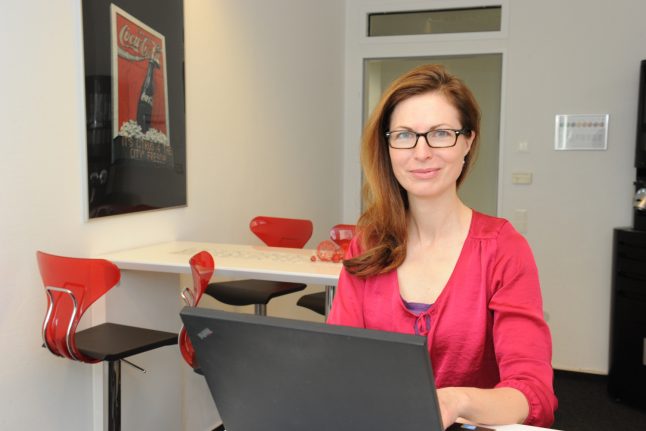When Wiesbaden native Jessica Dreyer started working at the US Army Europe headquarters in her hometown, she noticed an interesting phenomenon. At work, her American male colleagues were eager to find out if she had any single, German friends that they could meet. And in her personal life, her female German friends inquired about the potential availability of any of her US army co-workers.
“I thought, ‘I could make a business out of this’,” Dreyer tells The Local.
And so she did last summer, launching her matchmaking service under the name “US Love Wiesbaden”.
Business started to really boom after a few months when local media noticed the novel dating firm, and now she receives on average 60 to 80 new inquiries from Germans and Americans combined each week.
While she gets calls and emails from all kinds of people, including men seeking men and women seeking women, Dreyer says her biggest client base is German women seeking US military men and vice versa.
This, she says, is simply because of the numbers: The US Army counts 3,100 soldiers, 3,900 American civilian workers, and 1,100 retirees as part of its Wiesbaden Garrison. And around 85 percent of military personnel are male.
For a city that has a long history with the American military, such pairings between American soldiers and German women are also perhaps not so uncommon. Wiesbaden was captured by US forces in March of 1945 during the Second World War, and remained under American occupation after the war’s end. Troops have been present in the Wiesbaden area ever since.
Even beloved American superstar Elvis Presley spent some time stationed near Wiesbaden – a fact which the city proudly boasts about online – and made sure to carve his and wife Priscilla's initials into a Wiesbaden tree.
Plus, Dreyer also works with clients in nearby Kaiserslautern, where tens of thousands more American armed forces and government affiliates live in the largest US military community abroad.
But even though Germans and Americans have long lived with one another in the area, stereotypes on both sides persist, which perhaps drives some of the mutual interest.
“A lot of German women want to meet an American because they say they like the culture, the way of life, the music, being in the USA and the way they think American men are… They find a man in the US armed forces very attractive,” Dreyer explains.
“The way American men look and act, they seem very friendly and like they will be good partners because they are easy going. They think German men are not so easy going in life, and are too picky with things.”
And Dreyer’s American male clients sometimes have just as many preconceived notions of German women – including quite romantic ones.
“American men say they like the women here, they’re taller on average and seem a little more natural. A lot of American men say they love the idea of an international romance. They might like the accent, or the different heritage.”
Dreyer also makes it clear that she’s not doing this to help arrange marriages for legal purposes, like gaining citizenship. And for the most part, neither are her clients.
“To the people who say they just want to meet and marry [for citizenship], I say I’m not a marriage agency. This is about dating and relationships, not about getting a green card or something.”
To set up the matches, Dreyer meets with prospective clients in person to get a sense of who they are, as well as to ask them what they’re looking for in a mate. Her customers tend to be aged 35 and up, which she attributes to the fact that older singles are looking for more discreet and direct ways of meeting someone than dating apps with online profiles.
Dreyer charges men €189 for their first match – €50 more than she charges women, who she says she charges less because they generally earn less than the men. Fees for subsequent matches are then the same: €95.
An important factor in the matchmaking though, is that the German will almost always have to speak English: her American clients rarely speak German well enough to have a conversation, if they speak it at all.
“Most Americans don’t speak German well, but most Germans speak solid English… but if they say they don’t speak English, I have to tell them to consider how they think they can have a relationship with an American this way.”
But when it comes to dating norms, Dreyer says there aren’t the same barriers. Germans and Americans tend to have similar views on courtship, such as questioning who should pay on the first date. Just as in the US, in Germany the answer to this depends on the individuals, Dreyer says.
One thing that is a bit different is the question of marriage. Still, given that her business kicked off less than a year ago, Dreyer hasn’t had any couples get to this point yet.
“Americans expect marriage to come sooner. In Germany we tend to wait years before getting married. We want to make sure we have the right person on hand.”



 Please whitelist us to continue reading.
Please whitelist us to continue reading.